This document
explains how to get latest Visual-MinGW sources from
its CVS repository using MSYS and MSYS Developer
Tool Kit. (msysDTK)
1. Installing
MSYS
Download MSYS and msysDTK
from MinGW
project.
Install Msys distribution in
any directory, then install msysDTK over the
MSYS distribution.
Run MSYS from the
created shortcuts. You will get a terminal window, waiting
for commands.

MSYS' rxvt terminal.
The up and down arrow keys permit to
browse previous/next command line.
Shift + left
click pastes text into the terminal window.
Selected text is automatically copied to the
clipboard.
2. basic Unix shell
commands
Action |
Command |
Example |
change directory |
cd |
cd C:/Temp |
list files |
ls |
ls |
rename file/directory |
mv |
mv dir1 dir2 |
copy directory |
cp -R |
cp -R dir1
dir2 |
remove directory |
rm -rf |
rm -rf directory |
Caution:
rm -rf doesn't move files to the recycle bin! All files
in the directory will be lost.
3. Changing the current directory.
Change the current directory to the location containing
Visual-MinGW sources with the cd command.
Then, list files/directories with the ls command.
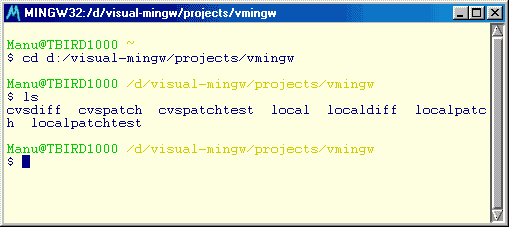
cd and ls commands.
4. Checking out the sources via an
anonymous cvs connexion
As explained in SourceForge's
CVS instructions, "cd" to the directory
where the sources are to be retrieved and type:
When prompted for a password, hit Enter and
check out cvs sources with the following:
(paste these commands with shift + left click)
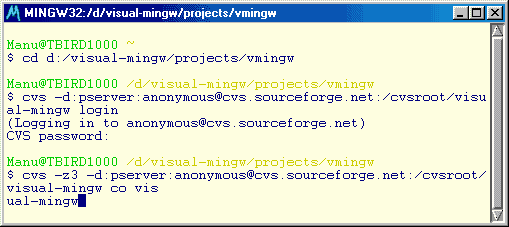
Check out cvs sources.
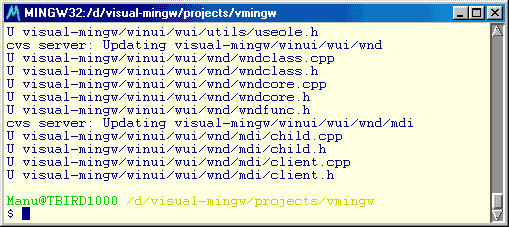
Check out completion.
ls shows the new visual-mingw directory:
Remove the local directory, copy visual-mingw
into local and rename visual-mingw
into repository.
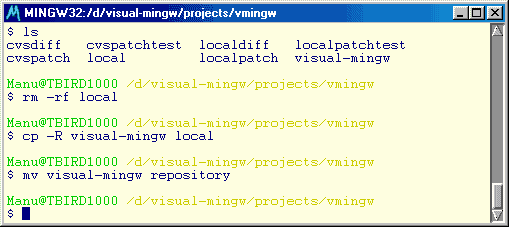
Create local and repository.
5. Updating source files in repository
Once all the files are out, you don't need to download
all again each time files are modified. You'll just
retrieve latest revisions with "cvs update".
"cd" to your copy of the repository
and type "cvs -z3 update -dP".
The -z option suits for compression, -d
retrieves new directories and their content, -P
removes empty directories.
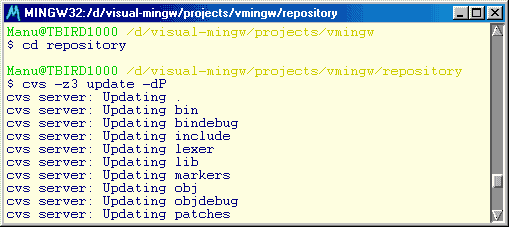
Updating source files.
You will proceed like this in the future to keep
your source files up to date.
Win9x users:
You'll find that cvs often freezes
after successful completion. Killing cvs with Ctrl
+ Alt + Del mostly cause Windows to crach. So, in
such case, ignore the frozen process, just keep its
window opened. It will wake up a few minutes after you'll
disconnect. Then launch another MSYS instance.
6. Using shell scripts to generate
diff files.
The local directory should be used to modify
and compile your source files locally, whereas repository
contains a verbatim copy of cvs files.
Then the cvsdiff shell script can generate
a diff file against local and repository.
Then you can submit the generated repository.diff
file as a patch. Note that new files in local
are not included in the diff file, these must be submitted
separately.
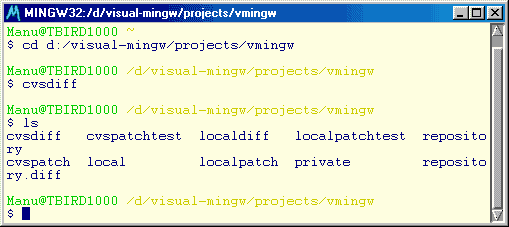
Generating a patch against cvs source
files.
7. References
Quick
Unix Tutorial
Unix Course (french)
Unix
Help
bash
User Manual
rxvt
User Manual
MSYS
mailing-list (subscription required)
|